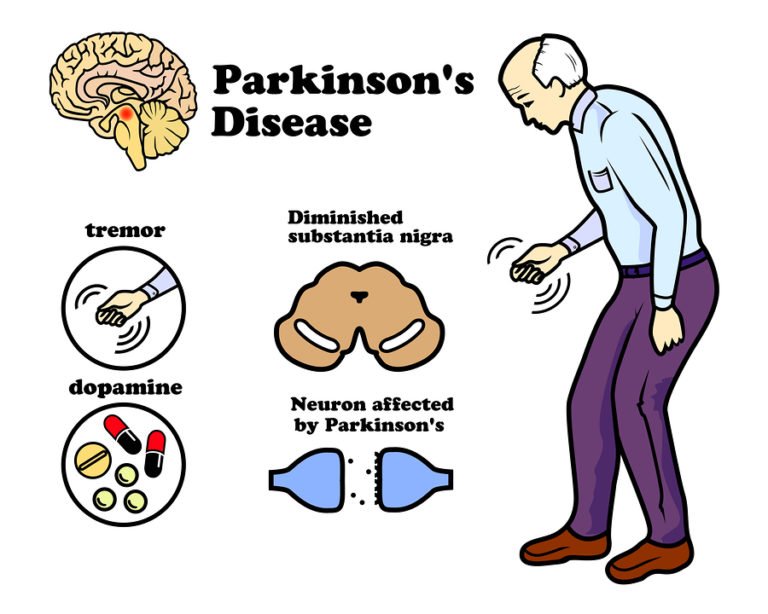Brain and ENT Clinic – Dr Lalit Mahajan In Nagpur & Dr Rachna Gangwani Mahajan In Nagpur
Parkinson's disease in Chhindwara

Parkinson’s disease in Chhindwara is a condition of brain and causes a specific area of the brain.Thus, The symptoms of this condition are more severe over time. However, Parkinson’s disease affects the muscle control, balance and movements of the body. It also affects the senses, thinking ability and the mental health of the patients.
The Parkinson’s disease is very common and second age related motor brain disease. The risks of this disease are increases with the age. Parkinson’s disease causes a specific area of the brain called basal ganglia starts to deteriorate. Basal ganglia are responsible for motor control, motor learning, behaviour and learning. When basal ganglia start to deteriorate patient’s losses their ability to control.
Firstly, Human brain uses chemical called neurotransmitters to control neurons to communicate with each other. Once, In Parkinson’s disease patients not enough dopamine and neurotransmitters. When human brain sends activation signals that tell your muscles to move. For instance, movement cells require dopamine, in Parkinson’s disease tremors form due to lack of dopamine.
Symptoms of Parkinson’s Disease:
Motor Related symptoms:
Motor symptoms are movements related symptoms, include the following:
- Slowed movements: The physical movements in Parkinson’s disease are difficult. This is symptom to diagnosis of this disease. Many people can consider that the slow movements are due to old age but actually it is from Parkinson’s disease.
- Tremors: The shaking of muscles in about 80% of Parkinson’s disease cause. The shaking starts in one hand or it may start with one foot. In some other condition that leads to tremor are multiple sclerosis, inflammation of the brain, and alcohol use disorder.
- Rigidity: Lead pipe rigidity is common symptoms of Parkinson’s disease. In these muscles feel stiff and the basic tasks are being difficult to manage such as getting out of the chair, rolling over the bed etc. also patients feel stiffness in limbs and neck.
- Posture and balance: There are lack of coordination and balance problem, it can increase the risk of falling.
Non-Motor Symptoms:
There are several symptoms in Parkinson’s disease not related to movements and muscle called non-motor symptoms.
- Autonomic nervous system symptoms: These include orthostatic hypotension, constipation, gastrointestinal problem, urinary incontinence and sexual dysfunctions.
- Loss of sense of smell: Patients with Parkinson’s disease faces some sensory changes like loss of sense of smell.
- Depression: Depression as well as anxiety is a common problem cause by change in brain activity.
- Trouble thinking and focusing: Parkinson’s related dementia in which patients may have difficulty in remembering things and clear thinking.
Medication and treatments of Parkinson’s disease:
Medication and treatments for Parkinson’s disease having two categories Direct treatments and symptom treatments. Also, you can consult with Dr. Lalit Mahajan.Direct treatments target Parkinson’s disease itself and symptom treatments treat effects of the disease.
- Adding dopamine: Medicine like levodopa increase the level of dopamine in the brain. This medicine always effective but it doesn’t work then some other form of parkinsonism is.
- Simulating dopamine: Simulating medication have dopamine-like effect. It is a neurotransmitter.
- Dopamine metabolism blockers: Human body has natural processes to break down dopamine. Dopamine metabolism blocker medicine helps to breaking down the dopamine and more available for brain.
